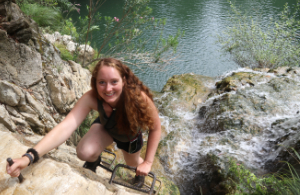Staff profile

| Affiliation | Telephone |
|---|---|
| Research Postgraduate (PhD) in the Department of Geography |
Biography
I am a trained geoarchaeologist with a special interest in human-environment interactions. I completed my undergraduate studies at the Ruhr University Bochum, Germany, where I focused on Prehistory and Ancient History as well as Archaeometry, with emphasis on Geoarchaeology, Geography, Earth Science and Archaeometallurgy. This led to an undergraduate thesis with a geoarchaeological topic, the progradation of the Great Maeander, Turkey, and its impact on the ancient cities on its shores, with a focus on Miletus.
I did my Master's degree in Geoarchaeology at the University of Heidelberg, Germany. I was able to expand my knowledge and skills, especially in Geography and Earth Science. In my Master's thesis, I investigated a dyke previously interpreted as being medieval for the project "Land unter?". The aim was to determine its structure and date using historical sources and scientific methods.
Currently, I am part of the EU Horizon2020 funded Marie Skłodowska-Curie ITN “i-CONN”, working on my PhD as Early Stage Researcher. My project focusses on Mesopotamian hollow ways using algorithmic approaches to reduce missing data and social network models to evaluate the tie formation processes of the settlement system in the Khabur Valley, Syria.
Current Research
I think an interdisciplinary approach is essential not only for archaeological or environmental research, but for all fields of scientific research. Therefore, I am part of the Marie Skłodowska-Curie Innovative Training Network (ITN) "i-CONN", together with 14 other Early Stage researchers all over Europe. The network aims to develop new approaches in the field of Connectivity Science through an international and interdisciplinary research team.
My project is concerned with the significance of networks for past socities. The aim is to investigate a route system, so-called hollow ways, in Northern Mesopotamia with computational methods and statistical models from the field of social network analysis. The aim is to evaluate how those models can help us to test our theories about the social, cultural and economic processes of ancient societies, in particular based on the physical remains of their networks of movement.
Research interests
- Agent-based modelling
- Computational Archaeology
- Geoarchaeology
- Human-environment interactions
- Landscape archaeology
- Networks of Movement
- Social Network Analysis

